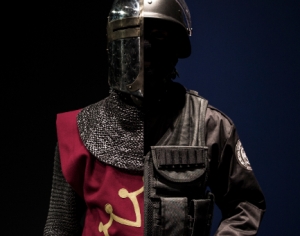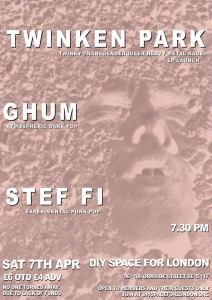A little way into the western edge of the City of London, between the jewellers’ quarter of Hatton Gardens and the gated enclave of Ely Place, there’s an inviting little alleyway – a tuckaway court still marked by Victorian streetlights, a little like an urban Narnia portal. As you wend your way up it, negotiating the gentle kink in the middle, a pub appears – a pub which gives the damnedest impression of having materialised from elsewhere and wedged itself into the cut-through.
This pub, Ye Olde Mitre, has actually been around in some shape or form since the middle of the sixteenth century – and for a long time it was perhaps London’s only example of a place which was in another place. Specifically, it was legally a part of Cambridgeshire. The beneficiary of a legal agreement regarding land jurisdiction set up around the London estate of the Bishop of Ely, it was the drinking establishment for his London servants. There are tall tales about people on the run from the City of London coppers claiming sanctuary in there, and arguing that the City police had no jurisdiction within the pub walls; no more than the Met did either.
Obviously this is a quirk of law, power and accommodation – mostly a long-standing in-joke for pint-supping conveyancers dropping in from the Inns of Court. Nonetheless, visiting Ye Olde Mitre always feels like taking a step into another kingdom, one which disregards standard unities of time and place in favour of fashioning its own. There’s the mythic touch added by the resident cherry tree, of course (which dates back to Elizabethan times and comes complete with its own Queen Elizabeth legend); but even when you’re not looking for magical signifiers – and long before you’ve become swimmy-headed on beer – the pub has the relaxed, self-contained air of somewhere entirely separate from the London bustle. Many pubs strive to become places in their own right; friendly drop-in nations. Content as its own little capsule of peace, Ye Olde Mitre manages it much better than almost anywhere else I know.
It’s unsurprisingly that such a place – one that flaunts and celebrates its quirky liminality – has drawn the attention of Marchland, the music-and-theatre production alliance which fixes and thrives on ideas of history and borderlines (as evidenced in their previous festival at the Bridewell a year ago.). This coming weekend, they’ll be taking over the pub, recasting it as “The Marchland Arms” and filling it with nine performances in three separate sections, turning the different spaces within the pub into murmuring, discursive rooms within which performance, music and song will gently ricochet.
* * * * * * * *
Three pieces make up the ‘Once And Future Europe’ section, triggered by Marchland’s “fascinat(ion with) the cultural history of the legendary states that once straddled Europe’s borders. For the three shows that make up this session we asked the artists involved to, in the words of Rimbaud, remember Europe and her ancient ramparts. This is work that explores the influence of those half-imaginary places on the European psyche, and how their legacy continues to influence our notions of identity and belonging.”The first of these pieces, ‘Lyonesse’, appears to be (at root) a conceptual celebration and exploration of the mythical drowned kingdom between Cornwall and Brittany – in other words, the sunken link in the geographical continuity of the broader Celtic nation. On spec, that sounds like a dusty old disinterral of Edwardian romanticism; but judging by the participants and their preoccupations, it won’t be. Poet-ecologist Dom Bury will, I guess, be mingling Lyonessean legend from his own West Country roots with contemporary concerns about flooding and dissolution, bolstered interjections and engagements from Katharina Engel, a German academic and theatre director whose preoccupation with hills and climbing may also feed into the work. The two will be accompanied by music from singer Sophia Brumfitt and veteran percussionist/hammer dulcimer player Dhevdhas Nair in a rich blend of European Early Music, Indian subcontinental music, jazz and African elements: Euromyth interfolding with full-world diaspora.
The pub snug will house ‘The Capital of Europe’ in which Charles Webber – whose two-decade-plus career as a sound artist has seen him write multimedia sound/light-and-music operas (he’s the artistic director of operaNCV), plus work with Crass’ Eve Libertine and innumerable experimental musicians and theatre companies – and Strasbourgian poet/Théâtre Volière co-director Mick Wood collaborate on “an installation of treated sound, found objects, and cut up poetry”, providing “an unguided tour through the abandoned corners, quiet squares and restless banlieues of an ideal, unreal city on the Rhine.” Sounds delightfully like an old pub story, but one which unfolds into multiple additional dimensions and textures; like that European flaneur’s collaboration between Johnny Morris and China Miéville which never actually happened.
Transforming the lounge, the last of the three ‘Once And Future Europe’ pieces – ‘Ionic’ – asks us to reimagine the space as“a café in fin de siècle Alexandria” in which a new dance theatre piece will play out. Rambert School graduate Janacek Wood choreographs an episode of interweaving texts and movements based around the work of Cairo-based, Alexandria-born Egyptian-Greek poet Constantin Cavafy, whose early life saw his family relocate between France, England and Constantinople in their own mournful, economically-driven private diaspora.
Cavafy himself ended up writing a body of work that’s a Hellenistic re-examination of what Wiki summarises as “uncertainty about the future, sensual pleasures, the moral character and psychology of individuals, homosexuality, and a fatalistic existential nostalgia.” The best-known of these poems is the sardonic Waiting For The Barbarians, in which an external exotic threat serves as both spice and hollowing-out of a moribund politics: I can’t think what that reminds me of now. Music comes from two Greek musicians – singer Savina Yannatou and classical guitarist Nikos Baroutsakis – and from electric guitarist/composer/personal ethnologist Alex Roth, who’s recently been pursuing his own Jewish diasporan heritage on a three-cornered journey that’s taken in Manchester, London and his current dwelling place of Warsaw.
* * * * * * * *
Three more pieces make up ‘Customs & Duty’, “a session of shows exploring the interaction between folk culture and high art, and how identities shift when the lines between arbitrarily imagined communities are blurred… Must we declare our customs at the customs post? Is it our duty to pay duty on them? To whom do they belong? Who decides what they’re worth? What will they cost us when they’re taken away, dissected, repackaged, and sold back to us?”For this, there’ll be a variation on the ‘Before and After Schengen’ piece which was one of last year’s Marchland centrepieces: Hungarian-born poet George Szirtes responses to Spanish photographer Ignacio Evangelista’s photos of border facilities, with guests and actors from the Marchland Arms Company contributing to a staging of the outcome, making the room “the Kafka-esque border post of a once or future East-European regime.”
Last time around at Marchland, Carneval String Trio’s viola player Shiry Rashkovsky contributed the ‘Shengen’ music. This year, she’s reviving a nineteenth-century middle-European tale with storyteller James Peacock in the shape of ‘Fritz and the Bohemian’ a tale of kindness, cyclic events and wanderings (“each year, on the first day of Spring, an itinerant musician comes to play beneath Fritz Kobus’ window…”).
Rounding off this section is a new Théâtre Volière play, ‘Goethe in Alsace’ – a one-act historical tale of cultural enrichment, “careless play-acting (and) casual cruelty” set around the border region of France and Germany, and questioning the assumptions and entitlements surrounding nascent male artists and the women whom they select as muses.
* * * * * * * *
The three final Marchland Arms pieces comprise ‘The Northern Marches’ and focus specifically on the Scottish and English border country “(a) region, rich with the history of the Border Reivers of the debatable lands, the Roman garrisons of Hadrian’s Wall, and dramatic elopements to Gretna Green, has other, fresher stories to tell. How does its often romanticised past inform the Scottish borders’ present, and to whom do its stories old and new actually belong?” For this section, there’s a play (of sorts), a talk and a musical session.Théâtre Volière return – teamed with poet Katie Hale and singing, fiddle-playing Scottish music specialist Lori Watson – to deliver a preview of ‘Gretna’: an actors/reciter/musician performance and ongoing project “exploring the culture of the region from the perspective of the women so often written out of its history.”
On the trail of linguistics and naming, University of Glasgow professor Eila Williamson provides ‘The Meaningful Merse’; throwing a little light on her REELS project work (Recovering the Earliest English Language in Scotland) in “a fascinating look at how history’s great, long term shifts in ethnic and cultural identity are often written in to the localised place-names, folk memory and dialects of Europe’s border regions.”
Finally, Lori Watson returns with her own set, performing in duo and bringing Scottish coastal and border folk music to close out the section in “a haunting collision between traditional music and found, ambient sound, in a performance ranging from the intimate to the epic.”
* * * * * * * *
There’s a general preview here:
Dates and times:
Marchland presents:
‘The Marchland Arms’
Ye Olde Mitre, Ely Court, off Ely Place/Hatton Garden, Holborn, London, EC1N 6SJ, England
- ‘Once And Future Europe’ – Saturday 23rd March 2019, 11.30am and 5.00pm / Sunday 24th March 2019, 7.50pm – information here, here and here
- ‘Customs & Duty’ – Saturday 23rd March 2019, 2.15pm; Sunday 24th March 2019, 11.30am and 5.00pm – information here, here and here
- ‘The Northern Marches’ – Saturday 23rd March 2019, 7.50pm; Sunday 24th March 2019, 2.15pm – information here, here and here










































